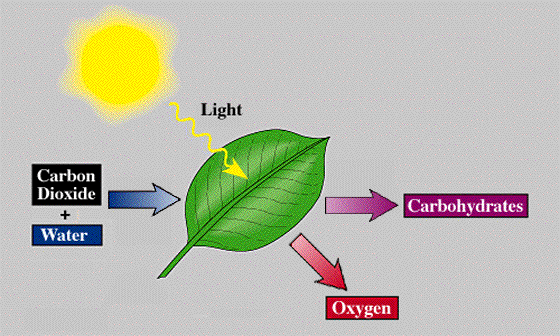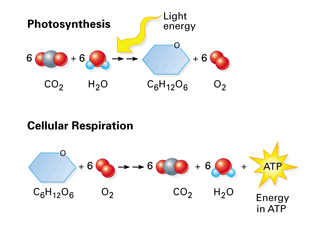
SC.912.L.18.9 Photosynthesis and Cellular Respiration
-
You need to know how photosynthesis and cellular respiration are related. They are opposite processes the products of one are the reactants of the other.
-
You need to know the reactants, products and basic functions of photosynthesis, aerobic, and anaerobic respiration.
-
You need to understand how ATP is connected with energy transfers within the cell.
-
You need to know that photosynthesis stores energy while cellular respiration releases energy.
PHOTOSYNTHESIS AND CELLULAR RESPIRATION POWERPOINT
TUTORIALS
Energy and carbon in Photosynthesis and Cellular Respiration
Photosynthesis and Cellular Respiration
ATP Synthesis During Photosynthesis
EOC Practice Questions
Anaerobic Respiration (NO Oxygen present)
Glycolysis 2 ATP
Fermentation 0 ATP
Total 2 ATP
Aerobic Respiration (Oxygen Present)
Glycolysis 2 ATP
Citric Acid 2 ATP
Electron Transport Chain 32 ATP
Total 36 ATP

PHOTOSYNTHESIS
The process by which plants algae and some bacteria capture the energy of sunlight light and use it to power chemical reactions that convert carbon dioxide and water into oxygen and energy-rich carbohydrates.
Light energy from the sun changes to chemical energy in glucose.
Photosynthesis captures and STORES energy

CELLULAR RESPIRATION/AEROBIC RESPIRATION
The process by which cells release the energy stored in food molecules in the presence of oxygen. All organisms carry out cellular respiration, bacteria, protist. fungi and plants except for a few bacteria
Cellular Repiration Equation




Mitochondria
The chemical energy stored in glucose is released and used to produce adenosine triphosphate (ATP)
Energy is transferred from glucose to ATP. Then ATP delivers the energy to the places in the cell that need it.
Cellular respiration RELEASES energy when glucose molecules are broken down

AEROBIC VS. ANAEROBIC
Metabolic processes that require oxygen are called aerobic.
Metabolic processes that do not require oxygen are called anaerobic, meaning “without air.
Glucose
Anaerobic respiration (fermentation/ without oxygen) is less efficient than aerobic because produces less ATP. Only 2 ATP are produced per glucose molecule.
When oxygen is present, pyruvate and NADH are used to make a large amount of ATP. Aerobic respiration is more efficient than anaerobic because produces between 36-38 ATP molecules per glucose molecule.
ATP is the type of energy the cell uses to carry out all cellular activities (to transport some substances across the cell membrane, to make proteins, to make organelles etc)
